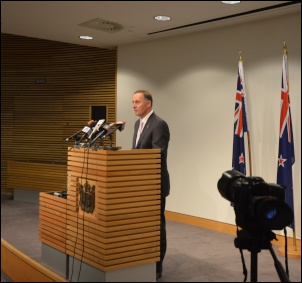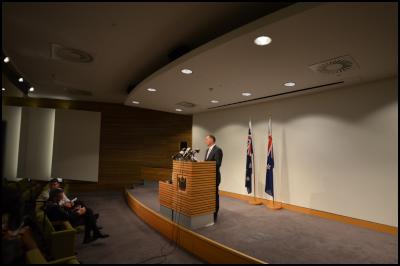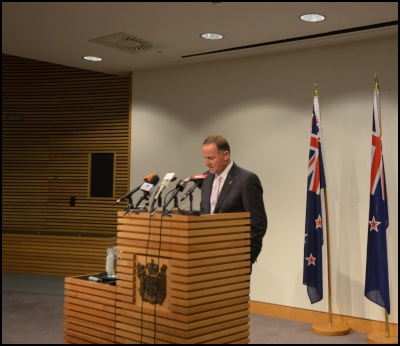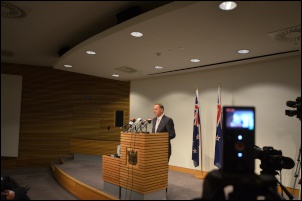PM Press Conference: Marae Matters | DCD Scare | Novopay
PM Post-Cabinet Press Conference - 4 Feb 2013
By Mark P. Williams

Today's post-cabinet press conference was brief due to the Prime Minister having a plane to catch. He spoke briefly about his week ahead including hosting Australian Prime Minister Julia Gillard at the weekend in Queenstown and plans for Waitangi Day. He added that he would unfortunately be unable to attend the funeral of the broadcaster Sir Paul Holmes due to being unable to make the flights after hosting Prime Minister Gillard.
He then took questions from the press gallery.
Questions
The PM was asked who would be escorting him onto the Marae. He replied that he did not have any details about it and that it would ultimately be a matter for the Elders to determine.
The PM was asked whether he was anticipating protests. He said that it was the pattern of the history of Waitangi Day and so some protest was to be expected.
The PM was asked about recent comments that the government had been treating Maori 'brutally'. He replied that the government had completed 56 Treaty Settlements, and that 33 of them had been completed in the last four years under the National government.
The PM was asked what he thought about the Maori Council's statement that they would be confronting him. He said that he understood the Maori Council's perspective on water rights and anticipated a number of meetings with them.
The PM was asked if he expected this year to be a particularly divisive Waitangi Day. He replied that it was hard to know, adding that when he went there in 2009 when he was first Prime Minister he had expected it to be a celebratory occasion, which famously proved not to be the case. He emphasised that the Marae was a place for both sides, Crown and Iwi to meet.
The PM was asked what the government's 'Plan B' would be if the Supreme Court ruled against them on the matter of water rights. He refused to comment.
The PM was asked who he thought would lead him onto the lower Marae on Waitangi Day. He indicated that he did not mind, saying "it'll be what it'll be".
The PM was asked whether he thought that Titewhai Harawira was bullying her was into a role in leading the PM to the Treaty ground. He said that he did not feel this to be the case.
The PM was asked if he would accept the Elder's choice for who would lead him onto the Marae. He responded that he would accept whatever their choice was and that he did not have any particular opinion.
On the matter of the Crown being taken to the Supreme Court by the Maori Council, the PM was asked whether it was the government's position that they were negotiating on all aspects of water ownership. He said that he would not comment on the Supreme Court decision but reiterated the government position that "no one owns water".
The PM was asked his thoughts on whether the DCD scare was adversely affecting trade with China, given that exporters of milk formula had found that the issue had "pretty much stopped trade with China". He responded that he had not seen evidence of this in terms of either Fonterra share prices or the New Zealand exchange rate suffering as a result. He said that the Government had accepted the view that there were no health issues associated with the levels and concentrations of DCD found in milk. He added that he was not sure what else could be done other than what Fonterra did do.
The PM was asked whether there should have been more direct, government-to-government discussions. He said that he understood that Tim Grosser had been in talks with Chinese officials but said that it was a matter to take up with the Minister directly.
The PM was asked why the Cabinet had agreed to delay the David Bain application for compensation. He responded that they had done so largely because they had been asked by Mr Bain's legal team in preparation for the next stage of judicial review.
The PM was asked about possible changes to the system of residency for New Zealanders in Australia, such as 'automatic residency' after a set number of years. He replied that Australia had given some consideration to such issues but that it was ultimately, purely a matter for the Australian government to decide whether or not to implement such a change after weighing up the economic factors.
The PM was asked if the DPMC was involved at all in Novopay. He responded that they were not.
The PM was then asked if Ministers were told that the idea of pulling out of the Novopay system altogether was being considered at the time when they approved it. He said that he could not answer that question as it is what the Ministerial inquiry is all about. He was then asked if he had seen any advice as to whether Talent2 had the financial strength to manage the system. He said that from the government's point of view the main thing was to see what needed to be done to fix the problem.
The PM was asked if he was concerned about the strength of the New Zealand dollar compared to the Australian and US currencies. He said that he felt it was over-priced against the US dollar but that it was indicative of the general economic robustness of New Zealand, arguing that it reflected long-term confidence in New Zealand and inherent weaknesses in the US economy.
The PM was asked his thoughts on New Zealand going to a three day postage week. He replied by saying that it indicated that there was a general awareness that the world was changing and that email and other electronic communications had supplanted many functions of postal services but that there was a consultation process that needed to be gone through. He made no actual comment for or against the prospect of a three day postal week beyond saying that he could understand the arguments.
The PM was asked if there was any room for a review of the handling of the DCD matter. He responded that he was sure that Fonterra was doing its own internal review. He was then asked if he thought the time lag was acceptable. He responded by saying that there was quite a bit of communication between the government and Fonterra around December.
The PM was asked what improvements he would like to see in terms of rights and entitlements to benefits for New Zealanders going to Australia. He responded that he "always encouraged a situation where New Zealanders are treated fairly" but emphasised that these questions were ultimately a matter for Australia.
The PM was asked whether there was an imbalance in rights between New Zealand citizens in Australia and Australian citizens in New Zealand. He responded that there was "clearly a difference" between how they were treated but pointedly refused to characterise it in terms of imbalance.
Click a link to play audio (or right-click to
download) in either
MP3 format or in OGG format.



Click for big version.



 Richard S. Ehrlich: The Dalai Lama's Escape & CIA Money
Richard S. Ehrlich: The Dalai Lama's Escape & CIA Money Binoy Kampmark: Addressing Hate Speech And Incitement - Holding Meta Accountable In Africa
Binoy Kampmark: Addressing Hate Speech And Incitement - Holding Meta Accountable In Africa Binoy Kampmark: Closed For Business - The Oddities Of Trump’s Tariffs
Binoy Kampmark: Closed For Business - The Oddities Of Trump’s Tariffs Martin LeFevre - Meditations: Teach Children The Distinction Between The World And Nature
Martin LeFevre - Meditations: Teach Children The Distinction Between The World And Nature Ramzy Baroud: Civil War On The Horizon? The Ashkenazi-Sephardic Conflict And Israel’s Future
Ramzy Baroud: Civil War On The Horizon? The Ashkenazi-Sephardic Conflict And Israel’s Future Gordon Campbell: On The Government’s Latest Ferries Scam
Gordon Campbell: On The Government’s Latest Ferries Scam